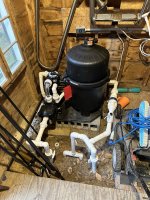- May 23, 2015
- 25,725
- Pool Size
- 16000
- Surface
- Plaster
- Chlorine
- Salt Water Generator
- SWG Type
- Pentair Intellichlor IC-60
To be fair, my installer said something similar regarding the anode. I asked for it based on everything I read claiming salt generators would cause corrosion to the heater. I figured it couldn’t hurt to add it. I also asked for it installed sideways or downwards but they were concerned it would be more likely to leak installed that way. Is the info about heat exchanger corrosion BS?
Corrosion is caused by poor water chemistry and, specifically, low pH. “Salt” has nothing to do with it. Your pool’s salinity is roughly 10% the salinity of seawater and even at 3600ppm it would still be considered only mildly brackish by the standard definitions of salinity. Pool builders and rando facebook internet “experts” love to state that salt water causes corrosion and make a big fuss about it without any proof otherwise. And, for all the people that hate on salt, guess what - every pool is a salt water pool because the chemicals and people we put in to the pool add salt. All chlorine based chemicals, both sanitizers and acid, end up as chloride eventually. So most pools will naturally have a salinity above 1000ppm and some get even as high as 2000ppm all on their own. So the idea that adding salt to water and using an SWG is somehow the death of a pool is bogus.
As for heaters, they corrode from bad water chemistry and, specifically, the improper use of trichlor pucks. Whenever TFP gets a new post from someone about how their heater is corroded and leaking, almost 99% of the time when they are asked for pictures you see a puck feeder sitting right after the heater in the plumbing. And, usually, when you dig in further you’ll find that they use a pool service and the pool guy adds chemicals directly to the skimmer or leaves pucks in the skimmer. The acidity of those trichlor pucks can not be overstated enough and trichlor feeders were never meant to be used on residential pools.
You have a heat pump. Most modern heat pumps use titanium tubing as the heat exchanger and so it is far less prone to corrosion than copper. Also, even if you put zinc and titanium in a galvanic couple, nothing will happen because titanium is not electro chemically active. It builds up a very strong and adherent oxide layer on the surface that will not conduct any electrical current. So the zinc anode does nothing for your heaters titanium heat exchanger.
So, at the end of the day, that zinc anode really isn’t doing anything useful but chemically corroding and throwing off scale into the plumbing. That may or may not be an issue but it is, at best, nothing more than a placebo. If you want to keep it there, fine, it’s not causing any chemical problems. But they are really not worth it or necessary to install.



